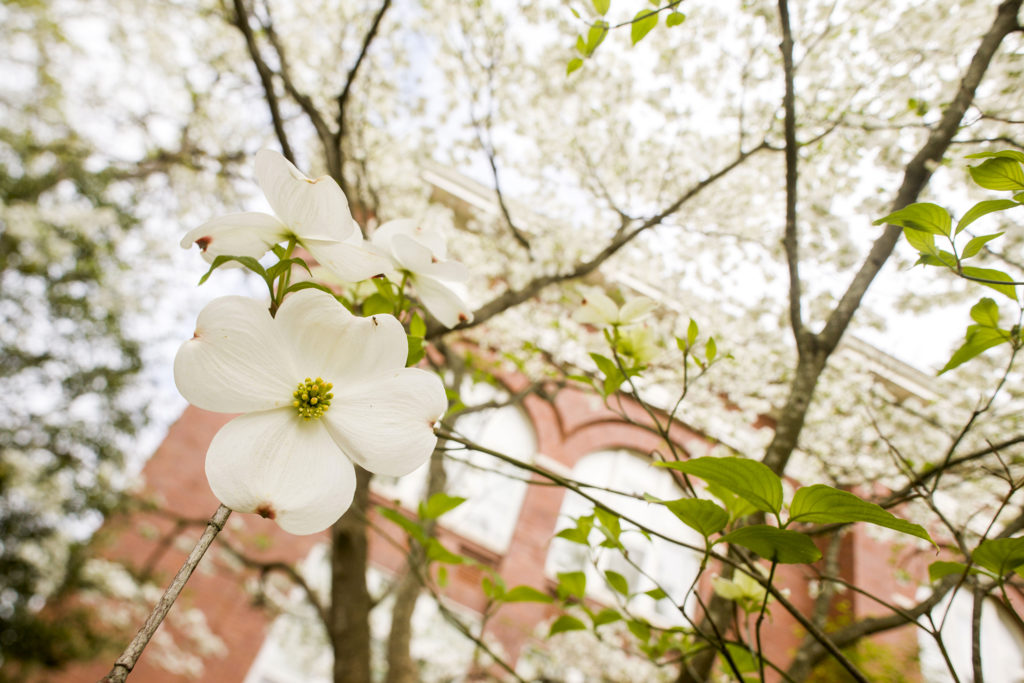Athens, Ga. – The flowering dogwood tree is associated with the beginning of spring throughout much of the U.S. Now, thanks in part to a $1.4 million grant from the National Science Foundation, a group of researchers from universities across the Southeast have joined forces to understand the genetics of this iconic tree.
Their Dogwood Genome Project will create the first complete genome sequence for dogwoods, ultimately enabling plant breeders to use genetic markers to guide cultivation of new varieties that are as beautiful as they are strong.
For their project to be a success, the researchers will have to collect a lot of data, and they’re asking dogwood lovers and science enthusiasts to help. The Dogwood Genome Project has teamed with the National Phenology Network, a collection of more than 6,000 citizen scientists across the U.S. who track the seasonal changes in plants throughout the year and share their findings through the Nature’s Notebook website.
“Dogwoods are one of the most popular ornamental trees in the country, but we don’t know a lot about its genetic makeup,” said Jim Leebens-Mack, the project leader and associate professor of plant biology at the University of Georgia. “Once we unlock the genome and begin comparing different varieties and species of dogwood, we can help speed breeding of trees that have varied flowering times, different colored petals and the ability to resist devastating diseases.”
Nature’s Notebook provides all the instruction and tools an observer needs to participate. Once registered, participants can help scientists by tracking native flowering dogwoods in their own community. The information gathered will help researchers identify the genetic and environmental influences that give trees certain traits.
“We know there are a lot of plant lovers out there, and this is a great opportunity for them to share their passion and make a really meaningful contribution to science,” said Leebens-Mack, who is also director of the Georgia Genomics Facility and a member of the Plant Center at UGA.
In the meantime, the research team, which includes scientists from UGA, the University of Tennessee and North Carolina State University, will begin their work by sequencing the genome of a popular dogwood variety commonly known as Appalachian Spring. This genome will serve as a reference for the team to compare with sequences from other dogwood varieties as well as trees sampled from natural populations.
These comparisons will yield information on the genetic basis of differences in flowering time, flower color and susceptibility to disease. Horticulturists will also use the genome data to guide their breeding programs and produce more beautiful and robust dogwoods.
One of the most important aims of the project is to identify genes that provide some dogwoods with natural resistance to fungal diseases like powdery mildew, which twists and deforms the leaves of the tree. This not only makes the trees less attractive, but it can also significantly weaken the tree’s ability to collect the sunlight needed for photosynthesis.
“Powdery mildew is a big problem for the dogwood industry,” said C.J. Tsai, a project co-leader and Georgia Research Alliance Eminent Scholar in UGA’s Warnell School of Forestry and Natural Resources and department of genetics. “If we can find the genes that give plants the ability to withstand this and other diseases, we can save the nurseries a lot of money and reduce the use of fungicides.”
Dogwoods account for nearly 10 percent of the retail market for flowering trees in the U.S., which tops $343 million annually, according to the USDA’s National Agricultural Statistics Service.
“This is a thriving industry, and we hope that our project will not only make dogwoods better for breeders and sellers but also more enjoyable for people who grow them at home,” said Tsai, who is also director of UGA’s Plant Center.
For more information about the Dogwood Genome Project or to register as a citizen observer, see https://www.usanpn.org/nn/dogwood_genome.
Other co-leaders of the project are UGA’s Magdy Alabady, Phil Wadl of the University of Tennessee and Jenny Xaing of North Carolina State University.
